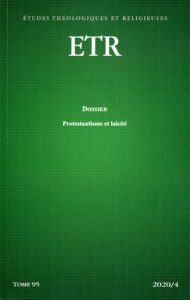Le principe de laïcité participerait essentiellement des débats philosophiques, historiques et politiques. Or l’idée, développée par Rousseau et reprise par la Révolution française, du contrat social d’un État laïc garanti par le culte de l’Être suprême, s’enracine entre autres, à travers sa réception réformée, dans la réflexion des premiers théologiens chrétiens sur la vie de l’église. Céline Rohmer et François Vouga s’accordent à montrer l’origine de la laïcité dans la réflexion critique des auteurs du Nouveau Testament. Leur argumentation s’appuie sur une lecture de la démonstration politique que Paul adresse aux Corinthiens (1 Co 12) et de la réflexion de l’Évangile de Matthieu sur l’identité et la discipline communautaire de l’église.
Mots-clés : laïcité, 1 Corinthiens 12, communauté, corps, esprit, transcendance, organisation
How could the spirit not be secular? Dialogue on Paul’s comprehension of the church
The principle of secularism partakes mainly of philosophical, historical and political debates. But the idea, developed by Rousseau and taken up by the French Revolution, of a social contract of a secular State guaranteed by the cult of the Supreme Being, takes root, amongst others, through its reformed reception in the reflection of the first Christian theologians on the life of the church. This article agrees to show the origin of secularism in the critical reflection of the authors of the New Testament. The argument relies on a reading of the political demonstration that Paul addresses to the Corinthians (1 Cor 12) and on the reflection in Matthew’s Gospel on the communitarian identity and discipline of the church.
p. 625-644
Auteur
VOUGA François
François VOUGA est professeur émérite de Nouveau Testament.
ROHMER Céline
Céline ROHMER est maître de conférences en Nouveau Testament à l'Institut protestant de théologie, Faculté de Montpellier, membre du Centre de recherches interdisciplinaires en sciences humaines et sociales (CRISES – EA 4424).
